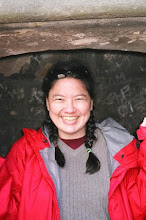E.O. Wilson out-charisma'd Bill Clinton

 I just saw this article from the Wired Blog Network entitled: "Bill Clinton out-charisma'd at the TED Prizes."
I just saw this article from the Wired Blog Network entitled: "Bill Clinton out-charisma'd at the TED Prizes."
This may say something about TED, or it may say something about the nature of presidential power (or rather the lack of it), but tonight was the first time I have ever seen Bill Clinton be the least charismatic person in a series of speakers.
The evening session’s theme was “I Have a Dream,” and TED curator Chris Anderson called it “the most important session of the conference,” as it was when the three winners of the TED Prizes would unveil the “wish” that each of them hoped to accomplish with the prize. (One of last year’s prizes led to today’s unveiling of the Open Architecture Network.)
First up was photojournalist James Nachtwey, who displayed a riveting series of photographs of human misery. He described documentary photography as “a kind of intervention” in the face of poor political judgment and political inaction -- as a way to give voice to ordinary people around the world. (Example: “A photo that showed the true face of war would almost by definition be an antiwar photograph,” Nachtwey said.) The nature of Nachtwey’s job made his wish a bit cryptic: “There’s a vital story that needs to be told, and I wish for TED to help me gain access to it, and then help me come up with innovative and exciting ways to use news photography in the digital era.”
Biologist E.O. Wilson followed Nachtwey by saying that he came on behalf of “insects and other small creatures,” to “make a plea for them.” Wilson’s wish: “I wish that we will work together to help to create the key tool we need to inspire preservation of earth’s biodiversity: The Encyclopedia of Life.” As I understand it, this would be a biological Super-Wikipedia, a collaborative project among scientists and amateurs that would contain information about all life on the planet.
“We live on a mostly unexplored planet,” Wilson emphasized. Recent years have seen the discovery of two new kinds of whales, a new kind of elephant, a distinct new kind of gorilla, and more. And on the microscopic (and smaller) scale, the earth is filled with the “dark matter of the biological world,” the bacteria, which are only beginning to be discovered.
“Our lives depend upon these creatures,” Wilson said. He estimated that 500 species of friendly bacteria live symbiotically with us in our mouths and throats, and that they probably fend of pathogenic bacteria. When it comes to species discovery, “Scientists are like explorers in a rowboat launched onto the Pacific Ocean.” (Wilson also allowed that he believes “true aliens,” creatures from outer space, might live among us on earth in the form of a bacterial species, which would have had billions of years to arrive.)
The “human juggernaut” is destroying the earth’s biodiversity, Wilson said, through habitat destruction (“including climate change”); the spread of invasive species, such as pathogenic bacteria and viruses, into every country; pollution; population expansion; and overharvesting, driving species into extinction through over-hunting and –fishing. (Wilson used the opening letter of each of these elements to create the acronym “HIPPO.”) Previous cataclysms of this sort, Wilson said, such as “the last one that ended the age of dinosaurs, took 5 to 10 million years to repair.”
In order to prevent catastrophe, Wilson said, “we need to have the biosphere properly explored.” He called for “a biological moon shot,” a project on the scale of the mapping of the human genome to map and discover the biological code of all of the life on the planet. The project, he said, could transform the science of biology and inspire a new generation of biologists to continue the quest that started for him 60 years ago: “to search for life, to understand it, and finally, above all, to preserve it.”
Chris Anderson took the stage and linked Wilson’s project with Nachtwey’s: As Nachtwey’s work has shown, Anderson said, to make victims visible will make the world more responsive to their fate.
Then Bill Clinton came and said something about health care in Rwanda. Yes, I know it’s important. But it was like listening to a State of the Union address after hearing a Nobel Prize acceptance speech.
I saw Clinton speak in person on a few occasions as president, and his head seemingly shone. Today, he stood in others’ halos.
All of the TED speeches are available to view online so you can see for yourself. These include videos from past winners and runners-up, as well. Some folks I'd like to check out: Richard Dawkins, Jane Goodall, James Watson, Al Gore, Tony Robbins, Dan Gilbert, Al Seckel, Craig Ventner, Michael Shermer.


Believe it or not, Ant scientists are quite popular at TED. In addition to E.O.'s stunning talk, we also had Deborah Gordon of Stanford speak a few years ago, and she was a triumph, too. (I don't think her talk is up yet.) We're pretty much in awe of the species you study, and thanks so much for the shout out about the new TED.com. Stay tuned for new talks every week.
ReplyDeleteCheers,
Tom Rielly
TED Conferences.
Myrmecologists (ant scientists) FTW! :)
ReplyDelete